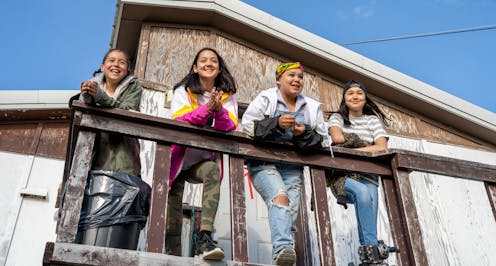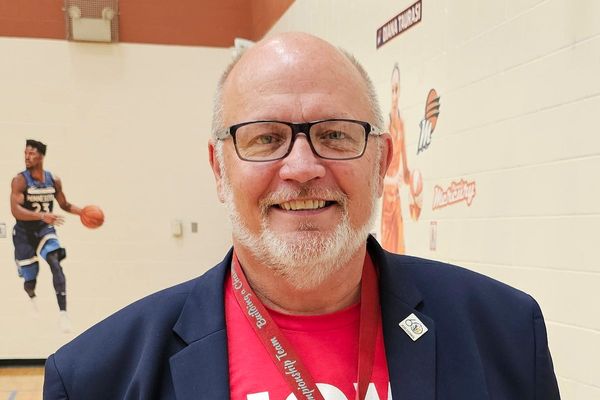
Decolonizing Lens is a film and discussion series based in Winnipeg that brings together Indigenous filmmakers, their films and audiences as a form of public education.
We began the series in 2016 after the publication of the Final Report of the Truth and Reconciliation Commission (TRC) of Canada and a gathering of Indigenous and non-Indigenous students facilitated by a youth-driven movement, the 4Rs. The 4Rs engages young people in cross-cultural dialogue toward reconciliation. We helped co-ordinate the gathering at the National Centre for Truth and Reconciliation (NCTR) at the University of Manitoba.
As educators, we share a commitment to Call to Action 65 of the TRC, which focuses on the roles of universities and the national centre in advancing understandings of reconciliation.
Participants at the gathering said they wanted to keep learning about Indigenous history, and about colonialism in Canada and its effects on Indigenous peoples and lands. They said they had not learned very much about these topics in elementary or high school.
Film screenings we have since organized, followed by discussions, aim to continue the conversation and help it grow.
First event: ‘RIIS from Amnesia’
Filmmakers Trudy Stewart and Janine Windolph travelled to Winnipeg in June 2016 to screen a documentary on the Regina Indian Industrial School, RIIS from Amnesia. The film details community efforts to protect the cemetery at the school site and commemorate children buried there.
We held the event at a local movie theatre, Dave Barber Cinematheque, and filled more than half of the ninety seats. Afterward, attendees asked us to hold another screening, and so Decolonizing Lens began.
Our series has grown substantially over the last eight years. While we have held events in Winnipeg theatres, our home base has become the Winnipeg Art Gallery–Qaumajuq, supported by a third partner in organizing this venture, Julia Lafreniere.
During the pandemic, we began hosting virtual events. Now, most of our events are hybrid, opening them up to audiences outside Winnipeg.
We have screened 102 films and hosted 105 guests. Guests have included filmmakers, residential school Survivors and Knowledge Keepers, academics and artists, community members and public figures. The films and discussions have reached thousands of audience members.
Year-round screenings
We have learned much over the years from films and filmmakers, and we hope audiences have too.
Beyond this, we have also learned important lessons. The first: there is no need to wait for a special day to have an event. Days such as National Indigenous Peoples Day and the National Day for Truth and Reconciliation are set aside to recognize and celebrate the history, resilience and diversity of First Nations, Inuit and Métis, and to honour the children who didn’t return home and Survivors of residential schools and their families.
Decolonizing Lens, on the other hand, reflects the idea that learning is always possible. Creating a more just society is everyday work rather than something to attend to a couple of days a year.
There are so many excellent films being made by Indigenous filmmakers on so many different topics and in diverse film genres — from documentaries like Cree Code Talker about Cree language speakers in the Second World War to horror films like Slash/Back about teenage girls fighting aliens in Nunavut — that we need more days to show them.
Film as accessible medium
We have also learned that films by Indigenous filmmakers, together with discussions, are an excellent way to celebrate Indigenous creativity and teach a diverse audience about history, current issues and how these relate. Films are largely an accessible medium and they bring people together for shared experiences.
Decolonizing Lens films reflect the beauty of Indigenous territories and worldviews, and they counter the idea that a singular “Indigenous perspective” exists.
Some films gently welcome newcomers to Inuit territory and culture, while others showcase the strength of Indigenous athletes. We’ve shown films on the joys of family and Anishinaabe cuisine and life in the heartland of the Métis Nation.
Stories beyond the stories
Having filmmakers discuss their films after screenings with Winnipeg-based filmmaker Sonya Ballantyne (Cree) allows audiences to experience not only the stories told in the films, but the stories behind the stories. These reveal the talent, dedication and thought required to make every film.
The lesson we keep learning is to trust that the right people will be there. All we can do is our best to make events as accessible as possible — they are free, include food and are hybrid — and then welcome all who come. Sometimes over 300 people attend a screening, packing the auditorium, while other events are more intimate.
It’s easy to get stressed about too few people showing up or too many, or the quantity of food, but worrying doesn’t help. Serving food before screenings, catered by Indigenous-owned businesses Feast and Shelly’s, helps to give events a community feel. Some people attend every event, while others choose based on filmmakers or topics.
Collaboration, partnerships
Perhaps the greatest lesson we have learned is that Decolonizing Lens works because of collaboration. While the series started with young people working together at the NCTR, it has continued with support from the NCTR, Winnipeg Art Gallery–Qaumajuq staff and the Women’s and Gender Studies Program at the University of Manitoba.
The National Film Board has also contributed by partnering on a number of screenings and providing films free of charge. Also important are the cooks who provide the food and multimedia artist Graham Constant (Cree) who designs event posters.
Decolonizing Lens has grown in partnership with filmmakers and others dedicated to celebrating Indigenous artists. In 2017, we had the opportunity to collaborate with WNDX Festival of Moving Image to screen and discuss films by Cree artist Kent Monkman.
In 2020, we worked with curator Jocelyn Piirainen (Inuk) to screen films connected to the Inuk Style exhibition. In 2022, we partnered with artist and curator Jaimie Isaac (Anishinaabe/British) to screen films from Turtle Island, Australia and Aotearoa (New Zealand) as part of the Naadohbii: To Draw Water exhibition.
Finally, films need audiences, and so audiences also contribute with their willingness to show up, learn from and appreciate the work and words of filmmakers.
We hope readers will become audience members at the next Decolonizing Lens event, on Sept. 12, which will celebrate the work of Winnipeg-based filmmaker Kevin Settee (Anishinaabe/Cree).
Jocelyn Thorpe has received funding from the Social Sciences and Humanities Research Council of Canada.
Kaila Johnston does not work for, consult, own shares in or receive funding from any company or organisation that would benefit from this article, and has disclosed no relevant affiliations beyond their academic appointment.
This article was originally published on The Conversation. Read the original article.







